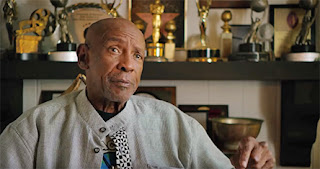Oscilloscope Laboratories will be bringing
documentary filmmaker Amy Scott’s Hal to
the home entertainment marketplace on Apr. 2 as both DVD and Blu-ray production
offerings.
This tribute to legendary auteur filmmaker Hal Ashby opened at the Sundance early last year,
played the film festival circuit and then had a brief arthouse theatrical pop
right after Labor Day.
Unless you were lucky enough to catch Hal at
one of these venues, Apr. 2 will be the next window of availability when it
arrives on DVD and Blu-ray … if you enjoy the movies — even casually — then
this one is a must-have come the first of April. If you have a film library, then it is
likely that you have one or more of his cinematic gems in your collection. Harold and Maude! Being There! Coming Home! Bound for Glory! If so, Hal
needs to be a companion piece.
For the record, the ARR works out to 207 days and
its limited (10 screen) theatrical run produced revenues of $48,579.
Hal Ashby made absolutely brilliant films in the
1970s. Without college or a film school
education, Ashby arrived in Hollywood in 1956 and learned the craft of film
editing (as an assistant) on such films as Friendly
Persuasion, The Big
Country and The Diary
of Anne Frank.
By the mid-60s he had advanced from assistant film
editor to editor and cut such films as The Loved
One and then four films for his mentor, Norman
Jewison — The Cincinnati Kid
(1965), The Russians Are Coming! The Russians Are Coming!
(1966, nominated for an Oscar), In the Heat of the Night
(1967, he won the Oscar for Best Film Editing) and The
Thomas Crown Affair (1968).
Over ten years learning the craft — it served him
well as a filmmaker in his own right.
It is said that he could see and assemble the film that he was directing
in his head; he knew where to set up and what to shoot.
Amy Scott’s Hal covers his early film industry
history and then hits its stride with a loving look back at his films, with
“comments” from Ashby — drawn from tapes, letters and memos from the period —
which is blended nicely with interviews
and remembrances from many of those who worked with him — Louis Gossett Jr. (The Land
Lord), Jon Voight (Coming
Home), Norman Jewison … it is a long and
impressive list.
In May of 1970 his first film as a director hit
theatres, it was the film adaptation of the Kristin Hunter’s 1966 novel, The Land
Lord, which earned Lee Grant an Oscar nomination
for Best Supporting Actress and starred Beau Bridges.
The film starts off one way, a comedy about Elgar
Enders, a privileged white kid (actually 29, but still a “kid” in so many
ways), who impulsively buys an apartment house in the middle of Harlem. He plans to “gentrify” it, which lends
itself to sort of a sitcom-feeling (you can imagine a television comedy
spinning off of the first act of the film).
But then Hal Ashby, takes the film in an entirely
different direction come the second act.
The Land Lord
becomes as an insightful look at race relationships, class and literally the
attitudes of “limousine liberals.”
During the Christmas season of 1971, one of the
greatest romantic comedies of all time opened theatrically. It was a strange love story blessed with a
knock-your-socks-off soundtrack … and many, many laugh-out-loud scenes. Off course we are talking about Bud Cort and
Ruth Gordon in Harold and Maude. Brilliant!
Hal Ashby had hit his stride and in the next eight
years he delivered The Last Detail
(Jack Nicholson nominated Best Actor), Shampoo (Lee
Grant wins the Oscar for Best Supporting Actress), Bound for
Glory (six Oscar nominations, including Best
Picture, with Haskell Wexler winning for Best Cinematography), Coming
Home (eight Oscar nominations, including Best
Picture and Best Director, with Best Actor and Best Actress wins for Jon Voight
and Jane Fonda) and one of the most amazing political satirical comedies ever
made, Being There,
complete with a genius performance by Peter Sellars as Chance (nominated Best
Actor).
Then came the “studio wars” and the decline in
Ashby’s career … two days after Christmas in 1988, at just 59 years of age, he
was gone.
Amy Scott’s Hal captures
it all, the man, the filmmaker, the films … a must for cinephiles.
Bonus features included with Hal are commentary with
filmmaker Amy Scott, who is joined by producers Christine Beebe, Brian Morrow,
Jonathan Lynch and Lisa Janssen, plus a behind-the-scenes reel and the
featurette titled “The Cutting Room Floor.”






No comments:
Post a Comment